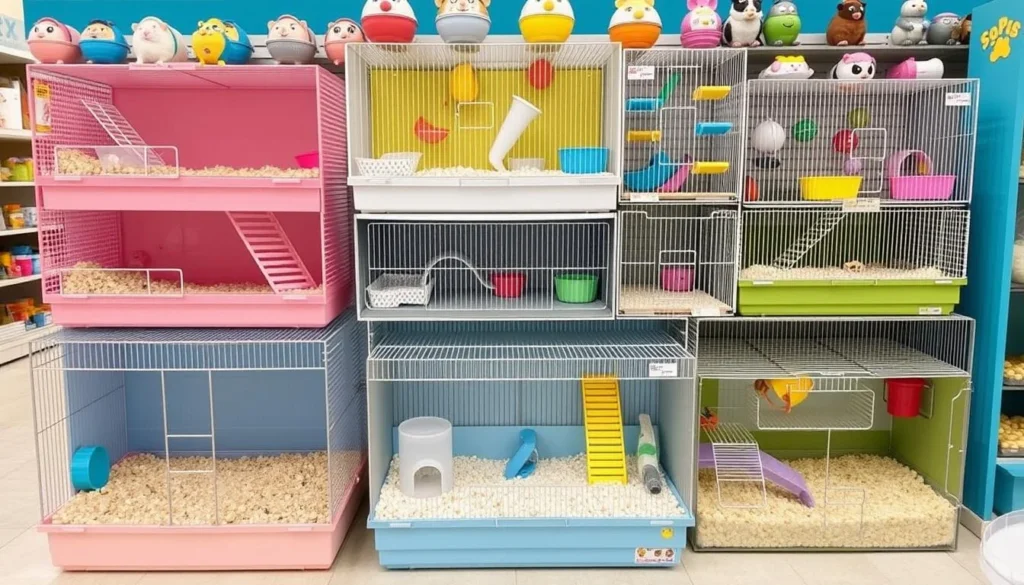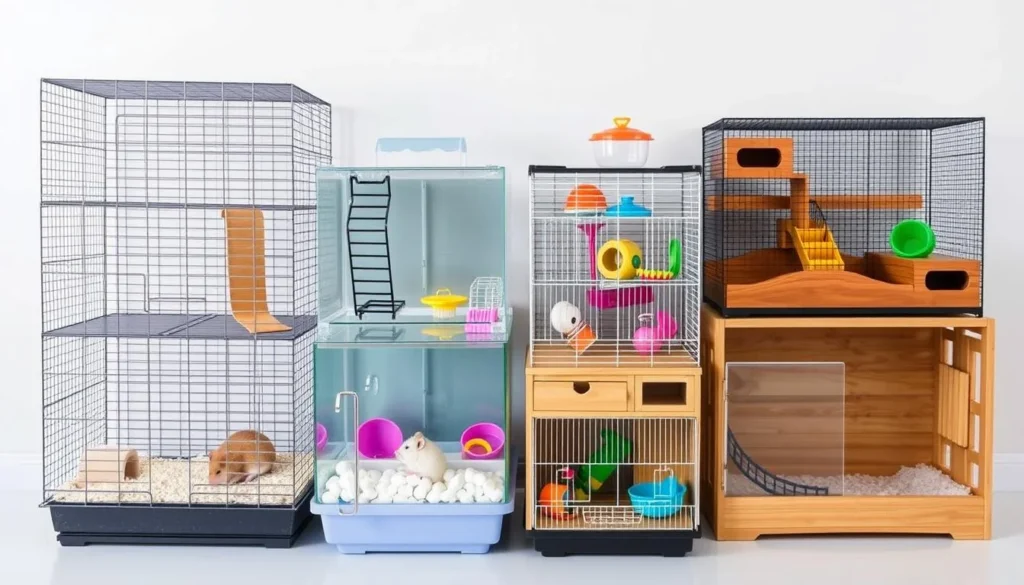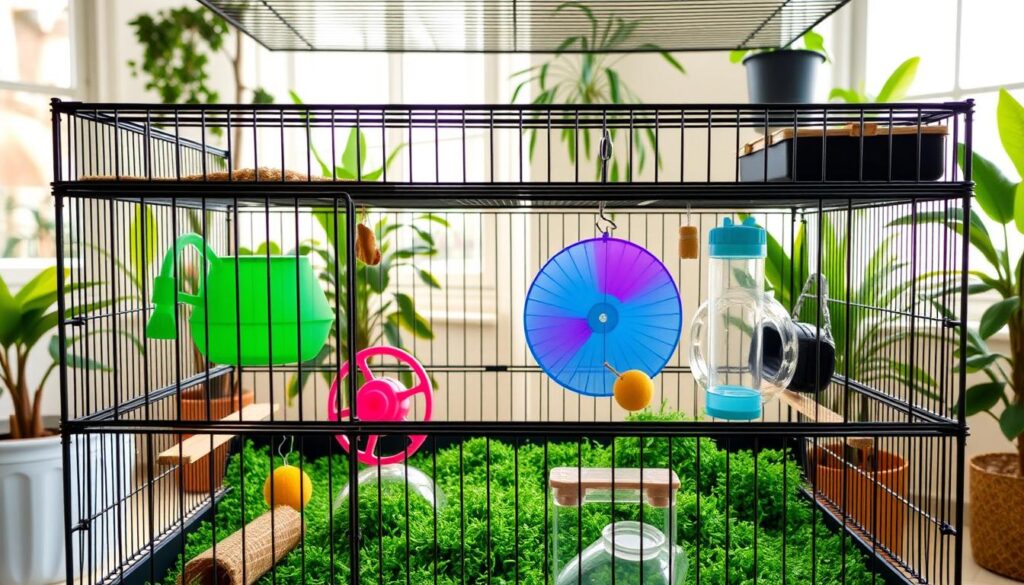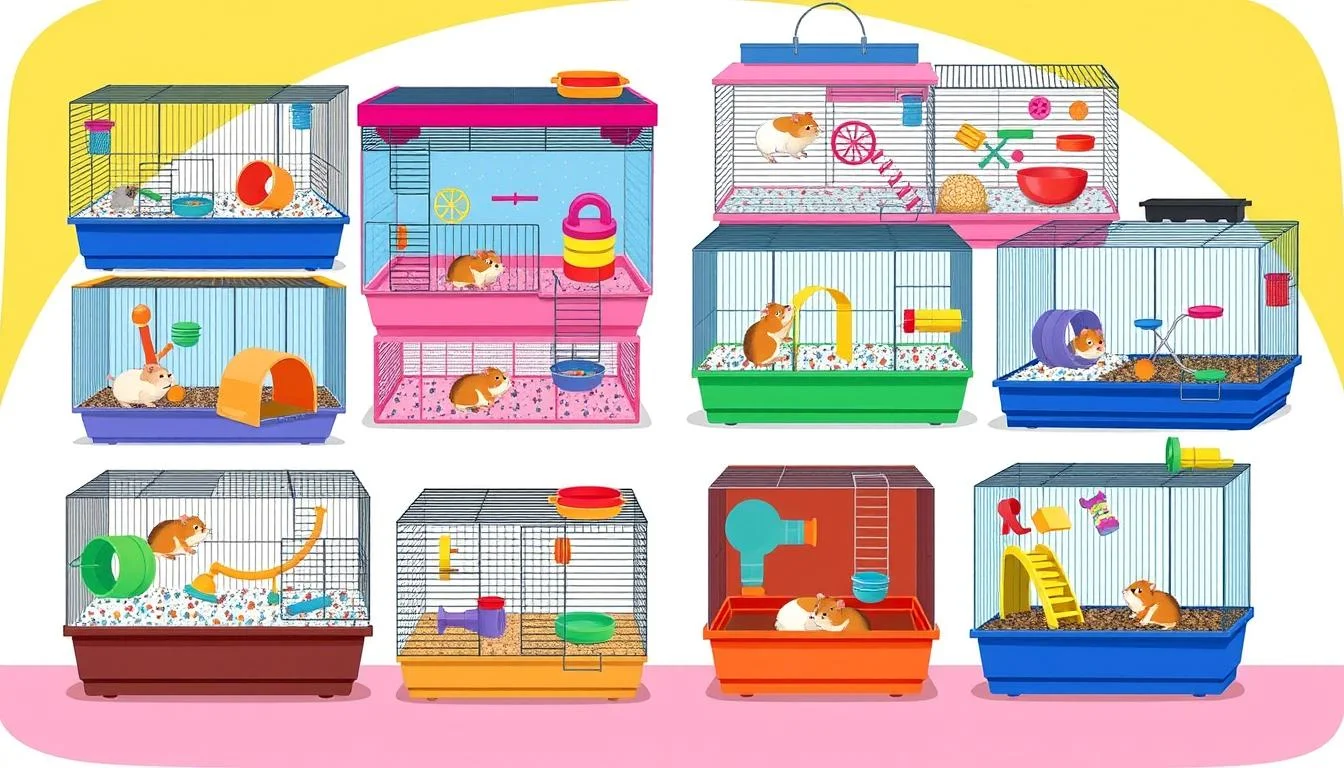Table of Contents
When I first brought home my tiny Syrian hamster, I didn’t know how important the right cage was. Those big, curious eyes made me see that a hamster cage is more than a place to live. It’s a safe, fun space for your furry friend.
Hamster cages are not just containers. They are complex spaces that affect your pet’s health and happiness. Whether you’re new to hamsters or upgrading, knowing about hamster habitats is key.
Different hamster breeds need different cage sizes. Syrian hamsters need bigger cages than dwarf hamsters. Syrian hamsters should have cages of at least 24 x 12 inches. Dwarf hamsters need cages of at least 18 x 12 inches.
Your hamster’s cage should be big enough for them to explore, burrow, and play. Hamsters can run up to 5-8 miles at night. So, a big, fun cage is important for their happiness.
Key Takeaways
- Choose a hamster cage that provides at least 600 square inches of unbroken space
- Consider your hamster’s breed when selecting cage size and design
- Prioritize ventilation and safety features in hamster cages
- Ensure proper bedding depth for natural burrowing behaviors
- Look for cages with multiple levels and enrichment opportunities
Essential Features of Quality Hamster Cages
Choosing the right home for your furry friend involves understanding critical aspects of hamster cage design. Whether you’re considering a wire hamster cage or a plastic hamster cage, several key features will ensure your pet’s comfort and safety.

When selecting a hamster habitat, space is the most critical factor. Syrian hamsters need substantial room to thrive. Here are the essential requirements:
Size and Space Requirements
- Minimum cage size: 24″ x 12″ for Syrian hamsters
- Recommended floor space: At least 360 square inches
- Minimum cage height: 12 inches tall
Pro tip: Larger cages always provide better living conditions for your hamster.
Ventilation and Safety Features
A quality wire hamster cage should have specific safety characteristics:
- Bar spacing no wider than 0.5 inches
- Secure latches to prevent escapes
- Good air circulation
“The right cage protects and enriches your hamster’s daily life.”
Material Durability and Construction
When comparing wire and plastic hamster cages, consider these factors:
- Wire cages offer excellent ventilation
- Plastic cages provide more integrated accessories
- Sturdy construction prevents possible damage
Invest in a high-quality habitat that supports your hamster’s natural behaviors and ensures long-term comfort.
Understanding Different Types of Hamster Cages
Choosing the right home for your furry friend is key. There are many hamster cage types to pick from. Each has its own benefits and challenges for your pet’s comfort.
Wire Cages: Ventilation and Visibility
Wire cages are a favorite among hamster owners. They offer great ventilation and visibility. These cages have bars close together to stop escapes.
- Maximum air circulation
- Easy cleaning capabilities
- Good visibility of your hamster
When picking wire cages, make sure the bars are no more than 1/2 inch apart. This keeps your hamster safe. Many wire cages also fit hamster cage tubes and accessories well.
Plastic Habitats: Containment and Mobility
Plastic habitats have their own perks. They keep messes in and often come with hamster cage accessories. They’re great for smaller hamsters but might not have as much air.
“The right cage can significantly impact your hamster’s quality of life.”
Glass Aquariums and Hybrid Options
Glass aquariums are perfect for hamsters who love to burrow. They’re heavy but let you see your hamster clearly. Hybrid cages mix materials for better comfort and function.

Modular and Expandable Systems
Modular hamster cage systems let you grow your pet’s space. They have tubes and sections that connect, growing with your hamster.
The best cage depends on your hamster’s breed, size, and needs.
Best Wire Hamster Cages for Maximum Ventilation

Choosing the right wire hamster cage is key for your pet’s comfort and health. Wire cages are great because they let in lots of air. This is very important for keeping your hamster healthy.
When picking a wire hamster cage, look for these important features:
- Bar spacing less than 1/2 inch to prevent escapes
- Deep base to contain bedding during hamster cage cleaning
- Sturdy construction for long-lasting use
Here are some top picks for wire hamster cages:
- Prevue Pet Products Universal Small Animal Home
- Dimensions: 32.5 x 19 x 17.5 inches
- Bar spacing: 9.6 millimeters
- Price: $86.99
- Savic Metro Heaven Extra Large Hamster Cage
- Dimensions: 80 x 50 x 50 inches
- Bar spacing: 9.5 millimeters
- Price: $136
“A well-ventilated wire hamster cage provides the perfect balance of safety and comfort for your small pet.” – Pet Care Experts
It’s very important to keep your hamster cage clean. Wire cages are easy to clean because of their open design and removable trays. Try to clean the cage every one to two weeks. Remove dirty bedding and disinfect the surfaces to keep your hamster happy and healthy.
When picking a wire hamster cage, think about your pet’s comfort, safety, and air needs. The right cage can really make your hamster’s life better.
Top Plastic and Acrylic Hamster Habitats
Plastic hamster cages have changed the game for small pet owners. They offer comfy and fun living spaces for hamsters. These modern homes mix function with cool design, making your pet’s life exciting.
Looking at plastic hamster cages, you’ll find many options. They meet different hamster needs and likes. These cages have special features that set them apart.
Single-Level Habitat Designs
Single-level plastic hamster cages are simple and easy to clean. They’re perfect for young or less active hamsters. The benefits include:
- Smooth, easy-to-clean surfaces
- Solid base preventing bedding scatter
- Transparent walls for easy monitoring
- Lightweight and portable design
Multi-Level Configurations
For hamsters that love to explore, multi-level cages are great. They have ramps, platforms, and spaces that let your pet climb and play.
Modular Hamster Cage Tubes
Hamster cage tubes turn regular cages into fun adventures. These systems let you build complex paths. This keeps your hamster busy and active. Some benefits are:
- Expandable tunnel networks
- Connecting multiple cage sections
- Encouraging natural exploration behaviors
- Customizable configurations
“The right cage can transform your hamster’s living experience from mundane to magnificent.” – Pet Care Experts
When picking a plastic hamster cage, think about your pet’s needs, space, and activity level. The best cage will be comfy, safe, and full of fun for your small friend.
Hamster Cages with Built-in Storage Solutions
Are you tired of searching for a hamster cage that keeps things tidy? Today’s hamster cages come with smart storage spots. These make caring for your pet easier and more fun. They keep all your accessories and bedding in one place.
“A well-organized cage means a happier hamster and a more efficient pet owner!”
When picking a cage with storage, look for these features:
- Separate spots for food and supplies
- Storage drawers that are easy to open
- Accessory hooks built right in
- Storage bins that can be taken out
Good storage solutions do more than just hold things. They:
- Keep supplies clean and dry
- Reduce mess around the cage
- Make it easy to get to what your hamster needs
- Help keep your home tidy
Pro tip: Pick storage that’s easy to clean and won’t get wet. This way, it lasts longer.
These cages cost about $200.61 and come with free shipping. You can return them within 30 days if you’re not happy. This makes buying one a smart choice.
Large and Spacious Premium Hamster Homes
Creating the perfect hamster habitat is more than just a cage. It’s about giving your hamster the space they need to be happy and healthy. A well-designed cage can make a big difference, providing room for your hamster to explore and exercise.
Hamsters are very active, running up to 5-8 miles a night in the wild. A spacious cage lets them show their natural behaviors. This is key for their physical and mental health.
Deluxe Multi-Level Options
Multi-level hamster habitats have many benefits:
- More floor space for moving around
- Platforms for climbing and exploring
- Hamster cage toys for fun and learning
- Vertical design saves space
Extra-Wide Single Level Designs
Hamsters who like to explore horizontally will love extra-wide single-level cages. These offer:
- At least 600 square inches of floor space
- Lots of play areas
- Places to hide
- Features for easy cleaning
Professional Grade Habitats
Experts say to look for cages that focus on:
- Good ventilation
- Strong materials
- Preventing escape
- Easy to keep clean
Remember, a spacious and well-designed hamster habitat is an investment in your pet’s health and happiness.
When picking a premium hamster home, look for materials like acrylic, wire, and high-quality plastics. They’re durable and easy to clean. Your hamster will be more active, less stressed, and healthier.
Budget-Friendly Hamster Housing Options
Creating a cozy home for your hamster doesn’t have to cost a lot. You can find great hamster cages that are easy on your wallet. Prices range from $30 to $200, so you can find something that fits your budget.
Here are some tips for finding affordable hamster cages:
- Look for basic wire cages with good ventilation
- Check second-hand marketplaces for gently used hamster cage accessories
- Consider plastic habitats that offer durability at a lower cost
- Prioritize cage size and safety over fancy features
Pro tip: You can often upgrade a basic hamster cage with affordable accessories to create a more enriching environment. Some budget-friendly hamster cage accessories include:
- Simple exercise wheels ($15-$40)
- Affordable hideouts ($10-$25)
- Chew toys ($5-$15)
- Basic food and water containers ($4-$15)
“A good home for your hamster doesn’t require a big budget, just thoughtful selection.” – Pet Care Expert
Even though bigger cages are better, you can make a small space great. Add multi-level platforms and creative accessories. With smart choices, you can give your pet a comfy and fun home without spending too much.
Essential Cage Setup and Maintenance Tips
Setting up the perfect home for your hamster is key. A well-designed habitat keeps your furry friend healthy, happy, and comfy.
Proper Hamster Cage Bedding Requirements
Hamster cage bedding is vital for your pet’s health. Experts say to use 2-3 inches of bedding for burrowing. Pick soft, absorbent materials that help with nesting.
- Use paper-based or wood shavings for optimal hamster cage bedding
- Avoid cedar or pine shavings, which can cause respiratory issues
- Replace bedding completely during deep cleaning
Effective Hamster Cage Cleaning Methods
Keeping the cage clean is key for your hamster’s health. Stick to a cleaning routine that keeps the cage clean without stressing your hamster.
- Perform daily spot cleaning of soiled areas
- Conduct a thorough hamster cage cleaning weekly
- Use pet-safe disinfectants designed for small animals
Strategic Accessory Placement Guidelines
Place hamster cage hideouts and accessories wisely. This creates a fun and stimulating environment. Make sure there are spots for exploration, rest, and play.
“A well-designed habitat mimics a hamster’s natural environment, promoting physical and mental health.”
Put hideouts in quiet spots to make your hamster feel safe. Change toys often to keep things interesting and prevent boredom.
- Position food and water stations away from sleeping areas
- Include multiple hamster cage hideouts for security
- Ensure accessories are securely attached
By following these tips, you’ll make a cozy and fun home for your hamster.
Conclusion
Choosing the right hamster cage is key. You want a safe, big space for your pet to play and be active. Studies say hamsters need at least 24 inches by 12 inches of space to be happy.
A good hamster home is vital for their health and happiness. A 2019 survey found that 72% of owners saw big improvements in their hamster’s life after a better cage. Look for cages with good air, secure doors, and room for toys to keep your hamster happy.
Hamster cages are more than a place to sleep. They’re important for your pet’s happiness and health. A big, well-made cage with the right bedding and air helps your hamster stay healthy and happy. Check your cage and make changes to make your hamster’s life better.
Creating a great hamster home shows you care deeply about your pet. The right cage means your hamster will stay healthy, active, and joyful for many years.
